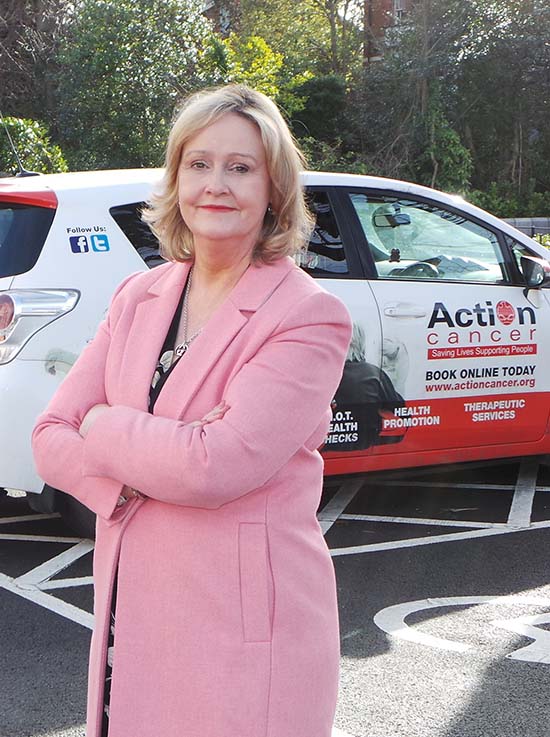Cancer charity takes action as it lays bare the impact the pandemic has had on cancer patients and their families
Action Cancer launched a ‘blended’ service as Covid-19 further alienates cancer patients and manifests feelings of “immense fear, loneliness and isolation”.
A charity director has issued a warning laying bare the traumatising impact the pandemic has had on those suffering from cancer, those who received new diagnoses and those who have passed away from the disease and their families.
Geraldine Kerr, Head of Professional Services at Action Cancer, was speaking after statistics revealed that Northern Ireland has the highest number of cancelled red flag cancer operations in the UK, according to the Royal College of Surgeons.
The study revealed that 4,630 urgent red flag procedures were cancelled between March 2020 at the start of the pandemic and January 2021.
Ms Kerr says on top of the cancellations, the pandemic has exasperated the feelings a person has when receiving or living with a diagnosis.

Ms Kerr, a health professional who has over three decades experience working to support people and families impacted by cancer, said: “In all my time working in healthcare I have never experienced the disruption to life and the immense fear, loneliness and isolation that this pandemic has brought to our society.
“The fear of loss of connectedness with others; the inability to get motivated with life purpose and hope and for some managing the death of a loved has been further exacerbated by the trauma of their cancer diagnosis.”
She said those feelings have been intensified by the pandemic which has disrupted treatments, follow up reviews, loss of social contact with others in similar circumstances and the inability to grieve properly. These findings were revealed in a survey carried out by Action Cancer.
“The additional heightened fear of getting Covid-19 on top of the already major emotional, psychological and physical adjustment to having cancer and requirement to shield has greatly impacted people and families.
“Whether newly diagnosed, in remission, living with cancer or at a palliative stage or bereaved, the disruption of life and the ability to socialise, mix and connect with others including family and friends has had a great impact on people’s mental health.
“In addition, the hardship of furlough, unemployment, additional costs of heating have put many into social and financial hardship.”
Ms Kerr has ensured that patients receive support from Action Cancer by providing a ‘blended’ service that allows for a mix of face-to-face appointments and online contact.
This includes counselling, complementary therapy including acupuncture, life coaching, scar therapy as well as a range of self-care strategies that ensure ‘wrap around’ support for families including children and young people with the physical, emotional, psychological and physical adjustment to cancer.
“We have adapted a blended approach that enables people to get support online and with some services such as scar therapy and acupuncture face to face with mitigations in place,” Ms Kerr added.
“We have simplified this so that it’s so easy for people to do and has had great uptake and feedback about the vital support it provides.
“It also allows us to reach out to people regionally and into rural communities where it is more difficult to access support and allows the confidentiality and privacy to have these supports in the comfort of your own home whilst saving travel costs.
“In addition, we developed online seminars that enable people to self-manage their care. For example, fatigue management, safe use of aromatherapies and managing loneliness particularly with added elements as a result of Covid-19.”
Feedback from the latter support has been documented by the charity, with Ms Kerr’s Positive Living Programme, which supports people with cancer to learn coping strategies, being praised for providing tools to help change lives.
“The extent and after effects and long-term impact of the pandemic is not yet known but we do know that it is having significant disruption on people’s emotional and mental wellbeing, managing cancer and the grief and increased loneliness through shielding and lockdown restrictions,” added Ms Kerr.
Looking to the near future, the charity hopes that the Covid-19 vaccine, coupled with the fall in infection rates, will allow for the resumption of medical treatments required by cancer patients as well as the full reopening of face-to-face support services.
Action Cancer Chief Executive Gareth Kirk added: “Action Cancer welcomes the reduction in pressure on our hospitals and looks forward to seeing it continue to fall in the days ahead.
“We have been calling for a proportionate and parallel approach to the management of Covid-19 and cancer since last March. Unfortunately, we believe our calls have largely fallen on deaf ears. If further lives are not to be lost, it is now imperative that cancer is given the priority and resources that it not only deserves but urgently requires.”
Patients and families can access Action Cancer’s services by calling: 028 9080 3344
or contacting online: www.actioncancer.org/appointments
























